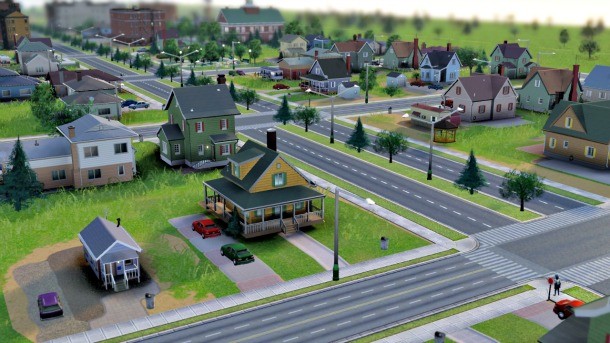SimCity Review

When people go on vacation, they occasionally become so attached to their exotic destinations that they want to stay forever. The unfamiliar streets and strange customs promise exciting new experiences far more attractive than the day-to-day drudgery back home. However, popular vacation destinations aren’t inherently better – people just don’t stay long enough to see the problems. This holds just as true for the digital destination of SimCity as any sunny Caribbean beach.
The first few hours of SimCity are wonderful. The basic premise is the same as ever: As a new mayor, you are charged with creating a thriving town from nothing. You still place residential, commercial, and industrial zones while hoping to hit population milestones, but that isn’t your only goal. The big innovation in this reboot is diversity. Players can specialize in different areas, like oil drilling, gambling, or manufacturing, and each path has a different set of goals and rewards. I love how each specialization uses the same city-building fundamentals, but forces players to dive into new mechanics and take alternate paths to success.
As a fan of the series since the original, I am amazed by all of the conveniences and details Maxis worked into the experience. Automatically routing all power, water, and sewage through the roadways is brilliant, since it minimizes the time you spend monkeying with each utility. As my cities grow, I love diving into the data maps to see how various factors respond. These maps show you things like land value, happiness, ground pollution, and they are all clearly (and stylishly) represented. I used to happily stare at the graphics and charts in the previous installments, but the data maps are a much more informative and elegant way to convey information.
I saw all of this as I played a review build of the game on EA’s test servers. When I continued to play after the official launch, cracks in the foundation started appearing. Everything that I initially liked about the game is still intact, but like placing a coal power plant in the middle of a residential block, dark clouds spread and pollute previously pristine areas.
The bigger your city grows, the harder it is to manage. Traffic congests roads during rush hour due to poor AI. No matter how many high-capacity roads you build, cars sit bumper-to-bumper instead of pursuing alternate routes. Critical vehicles like fire trucks and police cars also get caught in the traffic jams, in addition to responding inefficiently to emergencies in general (like sending every fire truck to a single blaze, even if multiple buildings are on fire). These AI and pathing problems also prevent other major features, like casinos and mass transit, from functioning properly. Even though the simulation is responsible for these failings, the alert messages players receive imply that they’re the ones doing something wrong.
Given those issues, it may be a blessing that your population is held back by the fact that you don’t have a lot of space to work with. Compared to previous installments, the smaller plot size in SimCity is apparently aimed at encouraging players to make multiple cities instead of a single sprawling megalopolis. However, I was cramped for space even when trying to build a city around a single specialization. To make matters worse, the inability to terraform means that you are stuck with the map exactly as it appears. If you just need a little extra space to expand your power plant or place a port, you’re out of luck. Individually, these shortcomings might seem like minor details – but in a simulation, the details are everything.
Prior to release, much of the discussion about SimCity revolved around the fact that it has no offline mode; it must remain connected to EA’s servers. I’m not going to use SimCity as a weapon to attack the larger concept of always-online gaming. Regardless of your feelings on that issue, SimCity undoubtedly benefits and suffers in many ways from the constant connectivity.
In its ideal state, SimCity fosters cooperation between players by encouraging cooperation within a region. Pooling resources and sharing services is the surest route to success, and collaborating with your friends is fun. This experience is what the always-online requirement facilitates – in theory. In reality, the first week of launch demonstrated the worst-case scenario: SimCity was effectively unplayable for several days. Maxis disabled certain features to ease the burden, most importantly the “cheetah speed” setting. Without it, your city’s growth and income is severely restricted by the slow pace the simulation is forced to maintain. As of this writing, cheetah speed is still not restored.
Even though the servers run better now, I still experience delays ranging from 5 to 45 minutes when trying to share services or gifts with other cities in my region, leading to confusion as to whether or not a problem has actually been resolved. Creating a new city is also a problem in some cases; if you don’t already have an Origin friends list populated by people playing the game, your chances of finding a decent region are low. You can’t search for available slots by any useful criteria (like types of specialization needed), so any casual player has to wade through a sea of garbage regions.
Given time, Maxis could clear up the problems with SimCity. The studio could deliver consistent server performance, restore cheetah speed, patch the AI, and give players larger cities. But games can’t be reviewed based on the product they might become; Electronic Arts and Maxis are charging gamers for this experience right now. At this point in time, it just isn’t worth your money.
For a closer look at the more positive elements of SimCity, check out our Test Chamber made prior to the game's release.











Get the Game Informer Print Edition!
Explore your favorite games in premium print format, delivered to your door.
- 10 issues per year
- Only $4.80 per issue
- Full digital magazine archive access
- Since 1991










